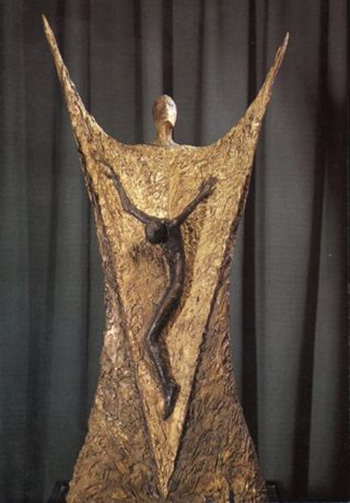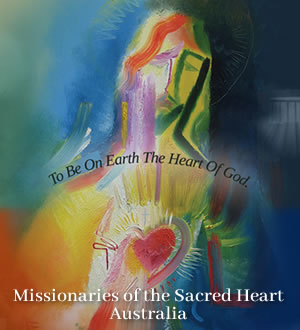In recent weeks, there have been two main themes running through the daily readings: the constant overtures of a longing and compassionate God to God’s children and the growing hostility and threat to Jesus’ life as the authorities sought to have Jesus killed. As this latter theme grows in intensity, we hear God’s outpouring of love and longing.
“I am about to create a new heaven and a new earth. The things of the past shall not be remembered or come to mind” (Isaiah 65:17ff.). “I will bring you back to the land of Israel … I will put my spirit in you that you may live … I have promised, and I will do it …” (Ezekial 37:12-14). “I will deliver them from all their sins of apostacy, and cleanse them so that they may be my people and I may be their God … I will make with them a covenant of peace … My dwelling will be with them …” (Ezekial 37:23, 26-28).
 What emerged for me was the profound beauty and depth of the total self-giving of Jesus as Savior. Each time I was drawn to stay with this, level upon deeper level of what it was for Jesus to save us, freeing us from sin and bringing us into the communion he shares with his Father, seemed to be revealed to me. Words do not do justice to this experience. It was one of seeing something, if only very little, of the enormity of Jesus’ love in the ongoing gift of himself, in bringing healing, compassion and life, even when so many seemed against him and the mission he received from his Father was, seemingly, failing.
What emerged for me was the profound beauty and depth of the total self-giving of Jesus as Savior. Each time I was drawn to stay with this, level upon deeper level of what it was for Jesus to save us, freeing us from sin and bringing us into the communion he shares with his Father, seemed to be revealed to me. Words do not do justice to this experience. It was one of seeing something, if only very little, of the enormity of Jesus’ love in the ongoing gift of himself, in bringing healing, compassion and life, even when so many seemed against him and the mission he received from his Father was, seemingly, failing.
I wonder what Jesus’ really felt in the agony in the garden. I imagine this was a horrific experience. Of course, Jesus didn’t want to die. He wanted to live and love and see his Father’s kingdom realized in a broken world. He wanted to bring his people to freedom and fullness of life. He wanted to bring God’s estranged children home. He wanted this for you and me. If was for this that Jesus lived and died.
Imagine his anguish in the face of seeming failure and of a life cut short. Only one thing mattered, amid the growing opposition Jesus experienced, and that was to love and for love to prevail. Jesus kept on loving to the end until his arms, stretched upon the tree of the cross, were opened wide in his embrace of absolute and unconditional love. As Philippians tells us, “Jesus emptied himself. Taking the form of a slave … he became obedient to the point of death.” (Phil 2:6-11).
Do we really appreciate the enormity of Jesus’ gift to us? Do we understand our identity, gifted to us through Jesus’ life, death and resurrection, as the beloved of God? Have we allowed ourselves to experience God’s unconditional love in the absolute forgiveness of sin and gift of freedom that Jesus is still bringing us? Yes, we are sinners and our weakness can so often dominate our lives. Yet, the truth is that we are deeply loved, forgiven and saved.
As we contemplate Jesus’ suffering and death, Ignatius of Loyola invites us to ask for the grace of compassion - to suffer with Jesus. Michael Ivens says this is “a suffering which is ours, but in and through which Christ makes us sharers in his own.”1 This is an invitation to deepening intimacy. It is to “ask for grief with Christ in grief, to be broken with Christ broken, for tears and interior suffering on account of the great suffering that Christ endured for me.” 2
What is our response in the face of such incomprehensible love for me? Ignatius of Loyola suggests one for us:
Take, Lord, and receive all my liberty,
my memory, my understanding,
and my entire will, all I have and call my own.
You have given all to me.
To you, Lord, I return it.
Everything is yours; do with it what you will.
Give me only your love and your grace,
that is enough for me.
As we ask for grief with Christ in grief, we might also ask to experience this with Jesus who is suffering in our brothers and sisters throughout the world. There are too many who are suffering in unimaginable ways including in the Covid 19 pandemic.
I came across a poem recently on Facebook that may invite reflection at this time. It was written in 1869 by Kathleen O’Mara.
And people stayed at home
And read books
And listened
And they rested
And did exercises
And made art and played
And learned new ways of being
And stopped and listened
More deeply.
Someone meditated, someone prayed
Someone met their shadow
And people began to think differently
And people healed.
And in the absence of people who
Lived in ignorant ways
Dangerous, meaningless and heartless,
The earth also began to heal
And when the danger ended and
People found themselves
They grieved for the dead
And made new choices
And dreamed of new visions
And created new ways of living
And completely healed the earth
Just as they were healed.
Reprinted during Spanish flu Pandemic, 1919.
Speaking recently, Pope Francis says the pandemic can be a ‘place of conversion.’ Two things he said stood out for me:
“Go down into the underground, and pass from the hyper-virtual, fleshless world to the suffering flesh of the poor. This is the conversion we have to undergo. And if we don’t start there, there will be no conversion.”
“What we are living now is a place of metanoia (conversion), and we have the chance to begin. So let’s not let it slip from us, and let’s move ahead.”
May you be abundantly blessed during these holy days.
Pauline fdnsc



